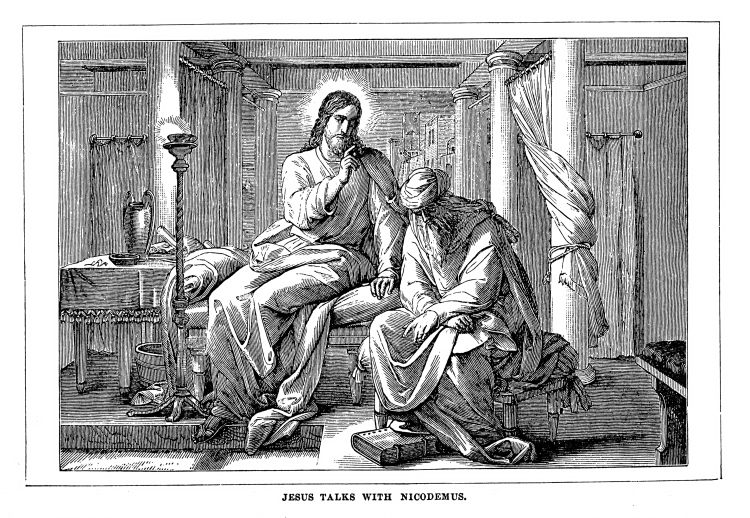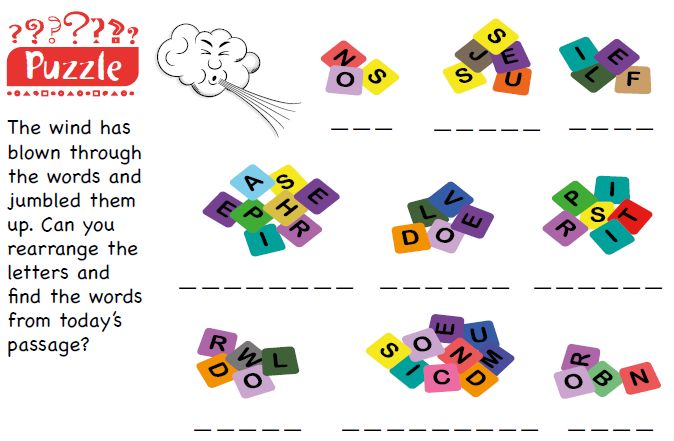
Hello everyone,
Welcome to the latest issue of our church newsletter. Our newsletter is sent out regularly to share reflections from services, Bible readings and church news to our church family. You can find previous issues on our church website here. We would love to hear from you and are always looking for uplifting and encouraging content to share in future issues of this newsletter. If you have any ideas or content that we can share, please do email them to Louise (publicity@christchurchuxbridge.org.uk)
Opening Prayer
O Lord, our God, the earth is full of your glory.
We come before your throne to worship you,
Father, Son and Holy Spirit.
As you were faithful to our ancestor Abraham,
so too are you faithful to us; your promises never fail.
You called Abraham and Sarah to start again in a new place.
You called Nicodemus to experience spiritual birth.
You call us to let you do something new in our lives.
We come to hear your call today. Amen.
(Taken from Roots)
Reflection from 26 February
Readings: Genesis 2: 15-17; 3: 1-7, Psalm 32, Romans 5: 12-19 and Matthew 4: 1-11
In our readings at the beginning of Lent, we are taken back to the beginning of creation, and to the origins of the story of God’s world. This is not just a good world in which all things are lovingly made in God’s image, but also as a world in which, from the beginning, there exists the reality of sin and disobedience and evil.
The story of the serpent and the temptation of the woman and the man is not so much a rational explanation of the origins of evil, as a story told of the reality of the results of disobedience. God asked one thing of his created beings – that they not eat of the tree of the knowledge of good and evil. But God had also given people the freedom to choose. And as soon as the possibility of choice popped up, people gave in to temptation and did what God, their Creator, had asked them not to do. From the beginning of time, people wanted to be like God, to be at the centre of the universe.
The reading from Romans points to the wrestling that goes on in the life of faith. Over the centuries people have struggled to make sense of the ultimate questions of good and evil. Why do bad things happen, the question is asked, especially when bad things happen to good people? If God is good, why did he make a world in which things go wrong? If God is all-powerful, why can’t he just put an end to mishaps and disasters?
In the early centuries of the church, there was a greater acceptance that this world contained both good and evil, and that we were each caught up in the struggle between good and evil. There was a greater sense of the otherness of God, who was both mighty and mysterious and whom people couldn’t just pin down.

Today there’s an expectation that everything should be immediately perfect, and if it’s not so, the question is raised as to why we should go on believing in God. And it’s usually those in our society who have least to do with the church who would argue this line most strongly. Our culture is one of material success – in which money and fame are the two key players. God’s call to be on the side of creation, of the poor and the oppressed, is too often sat lightly too.
In the church we are not immune from the wrestling that takes place about the role of good and evil in our lives and the life of the world. We are not immune from the struggles with temptation, as seen at the beginning of creation and in the life of Jesus.
Jesus’ humanity is shown in his own wrestling. Was he the Son of God? And if he was, couldn’t he just put the world right at a stroke?
Matthew writes of Jesus being led by the Spirit into the wilderness. It wasn’t just his own volition that was taking him into the desert; it was part of God’s purposes that he endure this time of testing. For forty days and forty nights he prepared himself. There’s a parallel between the Israelites being in the wilderness for forty years, a time of temptation in which they often gave in, and Jesus, fasting for forty days and then being tempted and being able to resist the tempter.
Lent is a time for our renewal and self-examination, focussing on where we are with God and what God is looking to from us. We do this through journeying with Jesus as he begins his journey to the cross. Our self-examination isn’t about navel-gazing, but about seeing ourselves in the light of Christ. Lent is a six week journey, in which we put a particular emphasis on praying, on giving to others, on seeing what we can do without.
We look back in particular to the journey of Jesus. There’s a debate that goes on – was he really 40 days and 40 nights without anything to eat and drink? It talks about him fasting – but doesn’t actually say whether that meant no food or just a limited amount of food. It doesn’t refer to refraining from drinking.
This journey was not a journey Jesus chose. It’s one he was led into – by the Holy Spirit. In Mark’s Gospel, it even says that he was driven into the wilderness, not by some whim or fancy, wanting to spend a few days away from it all, but by the Holy Spirit. For Jesus, it was a journey of testing – what did it mean to be the Son of God?
The three temptations lead us into seeing who Jesus is for us, and help us to enter into our own time of self-examination as we look at the ways in which we are tempted.
We can look at the way we’re each tempted in different ways, depending on the kind of people we are. E.g. some of us like lives full of activity and are tempted to be too busy; others like a slow pace and are tempted to put things off until another day.
Starting with Jesus at the beginning of Lent prepares us to travel on with our Lord to the cross.
There’s a particular thread which runs through the temptations – the thread of power. Each temptation opens up a different aspect of power and the way in which power can be used or misused. And in opening up different aspects of power, the temptations point us both to our inner struggles with power and take us to the kind of God in whom we can place our trust.
The first temptation is about bread. The devil says to Jesus ‘turn this stone to bread’. Jesus was hungry, after fasting for forty days. There would have been a real temptation to feed himself. But the temptation was wider than this. Why not feed the world? Wouldn’t it have been an instant success story if Jesus had been able to provide bread for everybody at the drop of a hat? Doesn’t God want people to be fed?
We see here the invidious nature of temptations. We’re most tempted by those things which would seem to have a good outcome. Wouldn’t it be great if we could feed the world, just like that?
Jesus’ response is both about his own self and about the life he’s bringing for the world. Bread wouldn’t be sufficient to feed him. Feeding is about body and mind and spirit, not just one of these. If he were only to offer the world bread, and not the nourishment of the spirit, he would be buying into a materialist agenda which ends up making us all consumers rather than persons.
Being offered bread, and offering bread to others, is a big attraction, but it’s only part of the story. God engages the whole person, not just part of the person. Jesus quotes the Hebrew Scriptures ‘One does not live by bread alone but by every word that comes from the mouth of God’.
The second temptation is again about power – the power of putting God to the test. If I were to fantasise, I could see Jesus thinking ‘yes, I am the Son of God, why shouldn’t I just leap off the Temple? Then everyone will know who I am and what power I have.’

One of the curious aspects of faith in our present day is the tension between people wanting God to act and being disappointed when God doesn’t act in ways they think God should. It can be a real temptation to think ‘if only God would do what I want’. And ‘if he’s a God that cares, shouldn’t he respond to my needs?’
One of the commentators wrote ‘God’s all-encompassing care is not a commodity to be gained by human beings through wheedling.’ Walking the Lenten journey is about putting our needs in the context of God purposes. The relationship we have with God is not about us testing God, but about God testing us. Can we trust enough in God that we don’t need to worry about leaping off high buildings to prove God?
The third temptation is even more clearly about power – power over the nations of the world. Jesus could have thought – isn’t this what I’ve come for? If at a stroke, the nations are mine, I won’t need to do any more. But the Gospel refers to the way it was the devil who was offering him this power, on the basis of Jesus submitting to the devil’s reign. The cost of this route would be the taking away of the nations from God and condemning them to a life of darkness and evil. Jesus’ responds ‘worship the Lord your God and serve only him.’
The challenge is both personal and political.
On a personal level, the key question is ‘who do I worship?’ ‘Who is at the centre of my life?’ ‘What are my main priorities?’
Lent is about reflecting on the grace and mercy of God as these touch our lives. In the tradition of observing Lent, each Sunday is free from what observance we might take up. And that’s so that we can keep reminding ourselves that the road we follow is not only to the cross and to death. When we follow in Jesus’ way, we know we are walking to the resurrection and the promise of new life. So we continue, through Lent, celebrating each week the day of resurrection.
On a political level, the question in the 3rd temptation is about the way God exercises power. God’s power isn’t imposed on the world, forcing people to do what God wants. God’s power comes out of the relationship that is built with God’s people, through worship and service.
In God’s world there aren’t easy options and quick fixes. There’s a long, slow steady work of building the kingdom. This work can go through many ups and downs and face many setbacks. For this work to move forward, it needs people who choose to live in God’s way, people who can resist the temptation for short term gain, in favour of a long term commitment to the one from whom real life comes.
Let us travel this Lent journey, in the sure trust in the God who is with us in settled places and on our travels into the unknown.
Let us take time again to see our own lives in the light of Christ’s life. Let us take the risk of travelling with Jesus to his lonely destination of the cross. Let us travel confidently, for we already know the life that is beyond death.
Revd Dr Elizabeth Welch
Readings for 5 March
John 3: 1-17 (NIV)
Jesus Teaches Nicodemus
Now there was a Pharisee, a man named Nicodemus who was a member of the Jewish ruling council. 2 He came to Jesus at night and said, “Rabbi, we know that you are a teacher who has come from God. For no one could perform the signs you are doing if God were not with him.”
3 Jesus replied, “Very truly I tell you, no one can see the kingdom of God unless they are born again.”
4 “How can someone be born when they are old?” Nicodemus asked. “Surely they cannot enter a second time into their mother’s womb to be born!”
5 Jesus answered, “Very truly I tell you, no one can enter the kingdom of God unless they are born of water and the Spirit. 6 Flesh gives birth to flesh, but the Spirit gives birth to spirit. 7 You should not be surprised at my saying, ‘You must be born again.’ 8 The wind blows wherever it pleases. You hear its sound, but you cannot tell where it comes from or where it is going. So it is with everyone born of the Spirit.”
9 “How can this be?” Nicodemus asked.

10 “You are Israel’s teacher,” said Jesus, “and do you not understand these things? 11 Very truly I tell you, we speak of what we know, and we testify to what we have seen, but still you people do not accept our testimony. 12 I have spoken to you of earthly things and you do not believe; how then will you believe if I speak of heavenly things? 13 No one has ever gone into heaven except the one who came from heaven—the Son of Man. 14 Just as Moses lifted up the snake in the wilderness, so the Son of Man must be lifted up, 15 that everyone who believes may have eternal life in him.”
16 For God so loved the world that he gave his one and only Son, that whoever believes in him shall not perish but have eternal life. 17 For God did not send his Son into the world to condemn the world, but to save the world through him.
Further readings from the lectionary this week are as follows:
- Genesis 12: 1-4a
- Psalm 121
- Romans 4: 1-5, 13-17
Our worship
We meet at 11am for our Sunday services, which are also live-streamed on our Facebook page. If you wish to view our services online, you can find them at www.facebook.com/christchurchuxbridge. You do not have to be a Facebook user to watch them – our services are publicly viewable. You can also view a recent service on our church website. Our service this week will be led by Methodist minister, Revd Dr Dong Hwan Kim. You can find the order of service here.
If you are unable to join us in person or online for our Sunday services, but would like to receive a recording of them on a memory stick to watch at home, please let us know.
Forthcoming services
5 March – Revd Dr Dong Hwan Kim (Methodist minister)
12 March – Christ Church worship group – parade service
19 March – Ade Benson (Methodist local preacher)
26 March – Revd Maggie Hindley (URC minister) – Holy Communion
Lent reflections
Tuesdays, 12.30pm – 1.30pm
28th February to 28th March 2023
Bible passages, discussion, quietness, reflection, prayer using Churches Together material and “Worship in Stillness”, by Susan Sayers.
Session themes:
28th February: Good and evil – God who protects.
7th March: God’s glory – God of journeys.
14th March: Sin, suffering and hope – God of acceptance.
21st March: Relationship and reconciliation – God of growth.
28th March: Parenthood and adoption – God who heals.
The sessions will also be available to join via Zoom using the following details:
Meeting ID: 975 3521 4949
Passcode: cclent
Church charity news
Church charity fundraising ideas needed
We are looking for ideas of ways that we can fundraise for Communicare Counselling Service throughout this year. There are a few events currently being considered – a cream tea in late Spring/early Summer, a quiz evening in the autumn and a silent auction around November time. Another idea which is being considered is a table-top sale if anyone would be interested in helping to organise this.
If you have any ideas for fundraising activities or would like to organise a fundraising event, please let one of the elders know so that we can start putting some fundraising events in the church calendar.
You can find more details about Communicare Counselling Service, our church charity for 2023 at https://christchurchuxbridge.org.uk/activities/churchcharity2023

World Day of Prayer service
Friday 3 March, 2pm
Our Lady of Lourdes & St Michael, Osborn Road, Uxbridge
This year’s theme is ‘I Have Heard About Your Faith’, based on Ephesians 1:15-19 and the service this year has been put together by women in Taiwan. All are welcome.

Other church events
URC 50th Anniversary Service
Saturday 15th April at Methodist Central Hall
For more information, please visit https://bit.ly/urc50
Part-time clerical assistant vacancy
We currently have a job vacancy for a part-time clerical assistant. The main duties will involve:
- Assisting in co-ordinating the day-to-day running of the church
- Keeping the church diary up to date with room bookings and exploring avenues for increasing income through room bookings and creative use of the church premises.
- Responding to enquiries and visitors to the church office
- Assisting with providing admin support to the Church Administrator, minister (when in post) and elders, including producing publicity materials and papers for meetings.
Applicants are sought with relevant experience, computer literacy and sympathy with the aims of the Church.
The post is for 15 hours a week (worked Monday – Friday)
Proposed start date: April 2023
Salary £9,350 – £10,300 per annum depending on experience
An application pack is available from the Resources coordinator (resources@christchurchuxbridge.org.uk)
Closing date for applications: 5pm on Friday 3 March 2023.
Children’s Corner

Praying for other churches
This week we hold the following churches in our prayers:
- Ruislip Manor Methodist
- Holy Trinity, Perivale (URC/CofE)
Closing prayer
God, you may call us to new lands,
new experiences on our journey.
Thank you that you go before us,
that you provide for us,
that your love surrounds us.
Wherever we go, you are with us;
may we honour you, wherever we are.
Amen.
(Taken from Roots)
